Ask people what they’ll eat at Thanksgiving dinner, and you’ll probably hear a few traditional dishes again and again: roast turkey, cranberry sauce, sweet potatoes with little marshmallows on top, pumpkin pie, and so on.
Some people even deep-fry turkeys in their backyards using 30-quart pots and 50,000 BTU burners — a practice so common and dangerous enough that firefighters across the country routinely post videos showing terrifying conflagrations resulting from various deep-frying errors.
Still others replace mainstream traditions with their own spin on the holiday, whether ordering pizza at home, going to a Chinese restaurant, or making dishes from their family’s cultural heritage.
What I’m trying to say is that there’s a robust tradition of experimenting with classic Thanksgiving traditions, whether following them to the letter, tweaking them, or rebelling against them.
After all, what’s important isn’t the details of the food but the ritual of gathering with loved ones and sharing gratitude over a meal.
So, how do you have Thanksgiving without the turkey?
If you’re transitioning to or are already immersed in a plant-based lifestyle — or simply want to leave the table feeling light and energized rather than stuffed and sleepy — there are plenty of food options besides omitting the turkey and serving only starchy sides and desserts.
You can elevate your Thanksgiving food offerings with hearty, flavorful plant-based entrees far beyond turkey or a processed vegan imitation like Tofurky.
Thanksgiving is the perfect holiday to rethink traditional menus and introduce more health-conscious and sustainable choices to your table.
In this article, we’ll explore seven plant-based Thanksgiving entrees that will leave everyone at the table feeling healthy and satisfied.
Ethical and Health Concerns With Eating Turkey
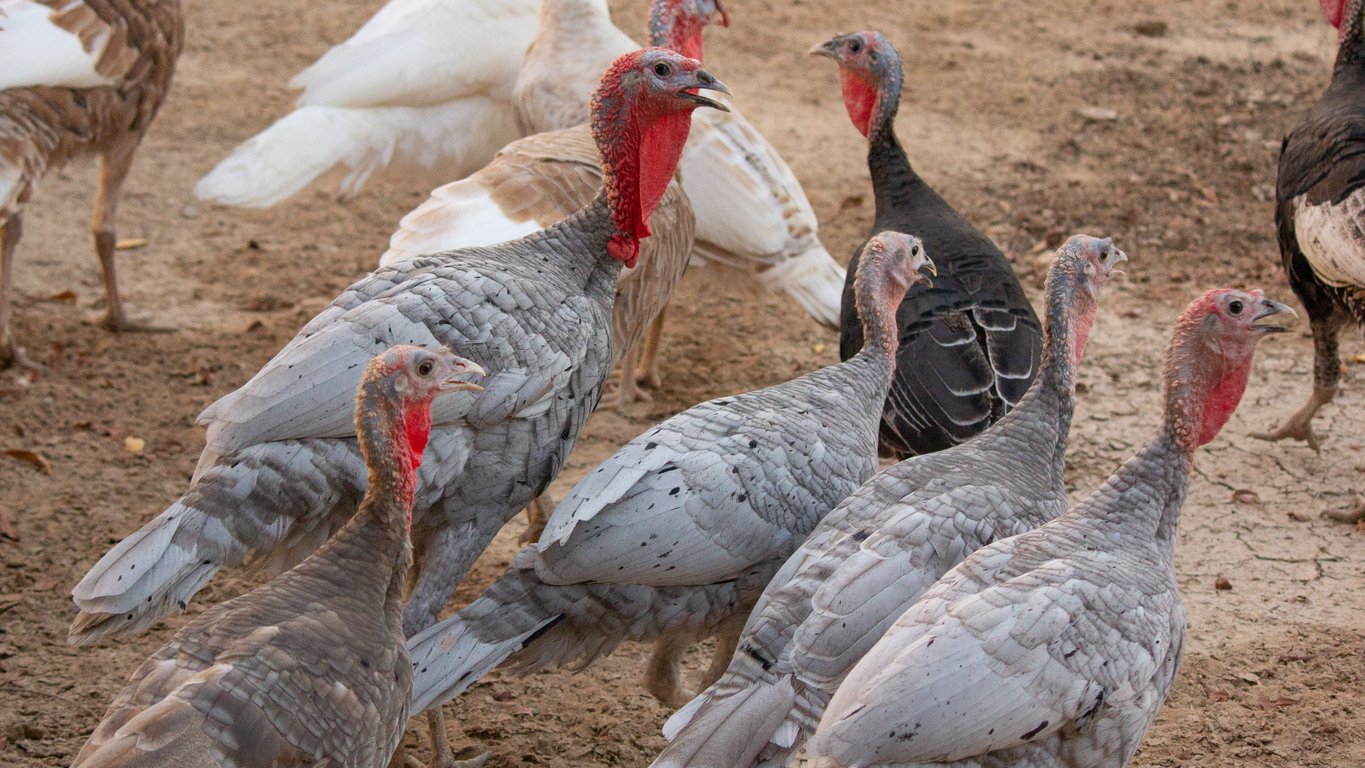
First, though, let’s talk about the issues surrounding turkey consumption in the US.
The broad-breasted white turkey is the most commonly raised for meat in the US. Unlike the mythologized image of a happy turkey gobble-gobbling while flying about the yard and hanging out with its friends, reality doesn’t resemble that image.
Turkey Welfare
As the name implies, broad-breasted whites have been selectively bred to have extremely large breasts. This means the turkeys grow unnaturally large (on average, double or triple their weight a few generations ago), leading to skeletal problems and organ failure. They can’t fly and can’t even reproduce naturally. The only way to make more broad-breasted whites is through artificial insemination.
Most of these turkeys are raised in large industrial facilities, more accurately described as factory farms. While the turkey industry portrays these facilities as efficient and conducive to the health and welfare of the birds, a deeper look shows something quite different.
Commercially-raised turkeys endure overcrowding, minimal access to natural light, and stressful environments. The stench of ammonia rising from their droppings is overwhelming. And there’s little to no opportunity for them to engage in natural behaviors such as foraging, establishing dominance hierarchies, courtship, and raising their young.
Instead, they endure confinement wing-to-wing and face slaughter between 14 and 18 weeks of age. That’s a tiny fraction of their life expectancy in the wild of three to four years (or 10 years in protected captivity).
Health Effects of Eating Turkey

Turkeys, like other animal products, are harmful to human health as well, especially if you have heart disease or a predisposition to it. Turkey meat contains cholesterol and saturated fat, both of which are linked to higher rates of cardiovascular disease.
Turkey meat also raises the levels of a hormone, IGF-1, that has been shown to fuel the progression of cancer.
And if you need another reason to skip the bird this Thanksgiving, let me be a bit graphic: their carcasses may be swimming in fecal bacteria. Turkey’s production has links to outbreaks of salmonella. (Maybe that’s why some people feel the urge to deep-fry it, to make sure all those bacteria are fully incinerated.)
Environmental Impacts of Turkey Farming
Turkey farming can also harm the environment, an ironic outcome for a holiday dedicated to gratitude for the earth’s bounty.
Industrial meat production is inherently resource-intensive. Like other poultry, turkeys are inefficient converters of plant calories into animal calories, with a ratio of about 13% (meaning that 87% of the calories from the plants don’t end up feeding people).
So, providing turkey for millions of Thanksgiving tables requires vast amounts of natural resources. The feed is often soybean-based, the majority of which is bioengineered (i.e., GMO).
To top it all off, farming turkeys also contributes to pollution and deforestation.
Can you see why I feel so strongly that choosing plant-based alternatives aligns more closely with Thanksgiving values? They enable you to reduce your ecological footprint while celebrating with compassion and health.
Vegan Turkey Alternatives
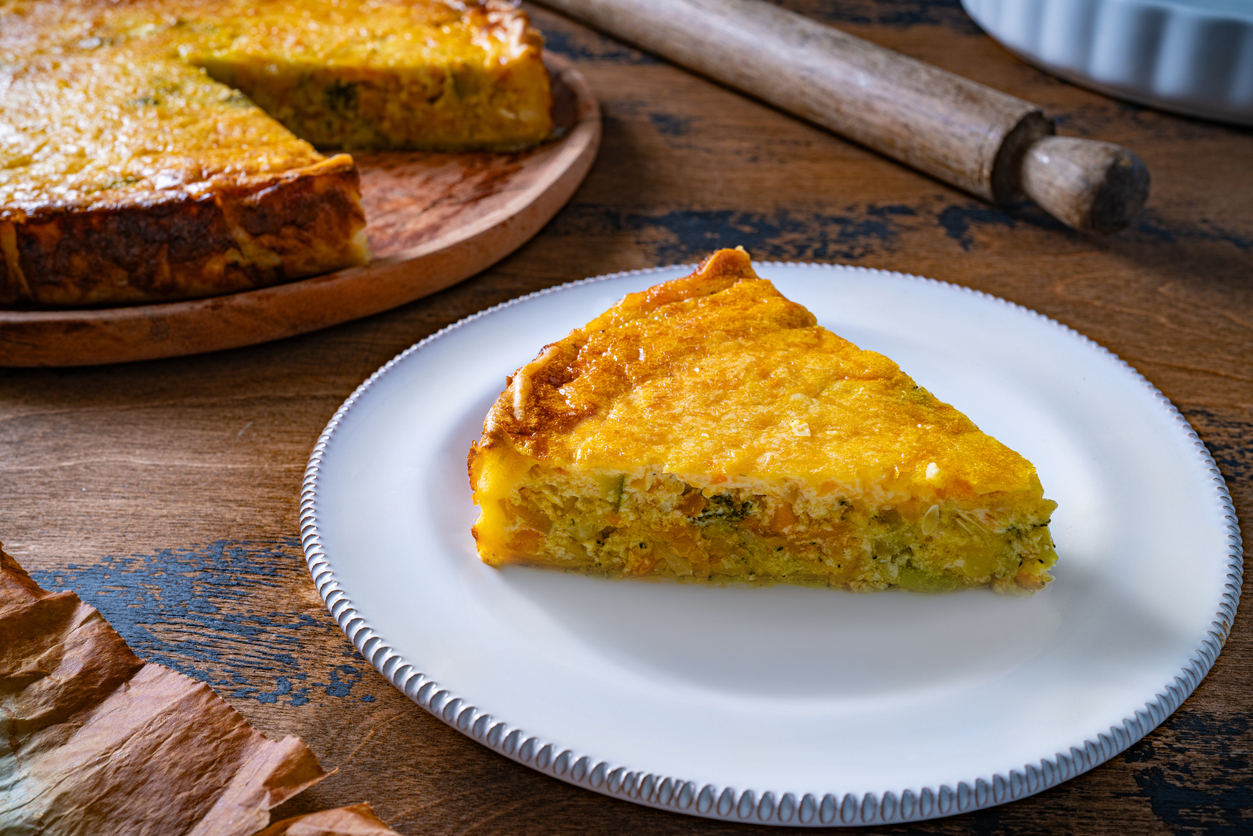
So now that turkey’s off the table, what’s on? How can we give our families and guests a culinary experience that satisfies them without the poultry centerpiece?
One key to creating satisfying vegan Thanksgiving entrees is using ingredients that provide the hearty textures and deep flavors that people have come to expect from the holiday.
That’s why plant-based turkey analogs like Tofurky and Field Roast are popular alternatives. I’m glad these transitional foods help people take “baby steps” into plant-based living. However, they can also contain highly processed ingredients, refined oils, natural flavors, preservatives, added sugar, and sodium.
As a once-a-year treat, that might not be a big deal, but Thanksgiving is also a great opportunity to showcase how delicious and satisfying plant-based home cooking can be.
So, what are some good vegan Thanksgiving entree options?
Think of hearty, protein-rich whole foods like lentils and other legumes that often form the base of plant-based meat alternatives. Consider plants with a naturally “meaty” texture, such as jackfruit and mushrooms. And if you don’t mind a little processing, you can use seitan, wheat gluten with the starch removed, as a turkey meat analog.
Of course, your entrees don’t have to mimic turkey at all. You can lean on culinary traditions from various cultures, like a plant-based Italian lasagna or an Indian or Thai curry featuring a seasonal veggie like pumpkin.
Other options include pot pies, Shepherd’s pies, casseroles, seitan roasts, lentil loaves, stuffed squashes, grain bowls, and more — you’re limited only by your imagination.
Vegan Thanksgiving Entree Recipes
Bring new life to your Thanksgiving spread with these seven mouthwatering plant-based mains that prove you don’t need turkey for a memorable feast! Each recipe offers a unique blend of flavors, from smokey and spiced to creamy and comforting, with vibrant ingredients that highlight the season’s best.
Whether it’s a cozy casserole, a hearty stuffed squash, or a bold tempeh bowl, these dishes are designed to stand out and satisfy. Perfect for a festive, vegan-friendly Thanksgiving table, these mains will impress and become holiday favorites!
1. Autumn Farro Salad With Butternut Squash and Kale
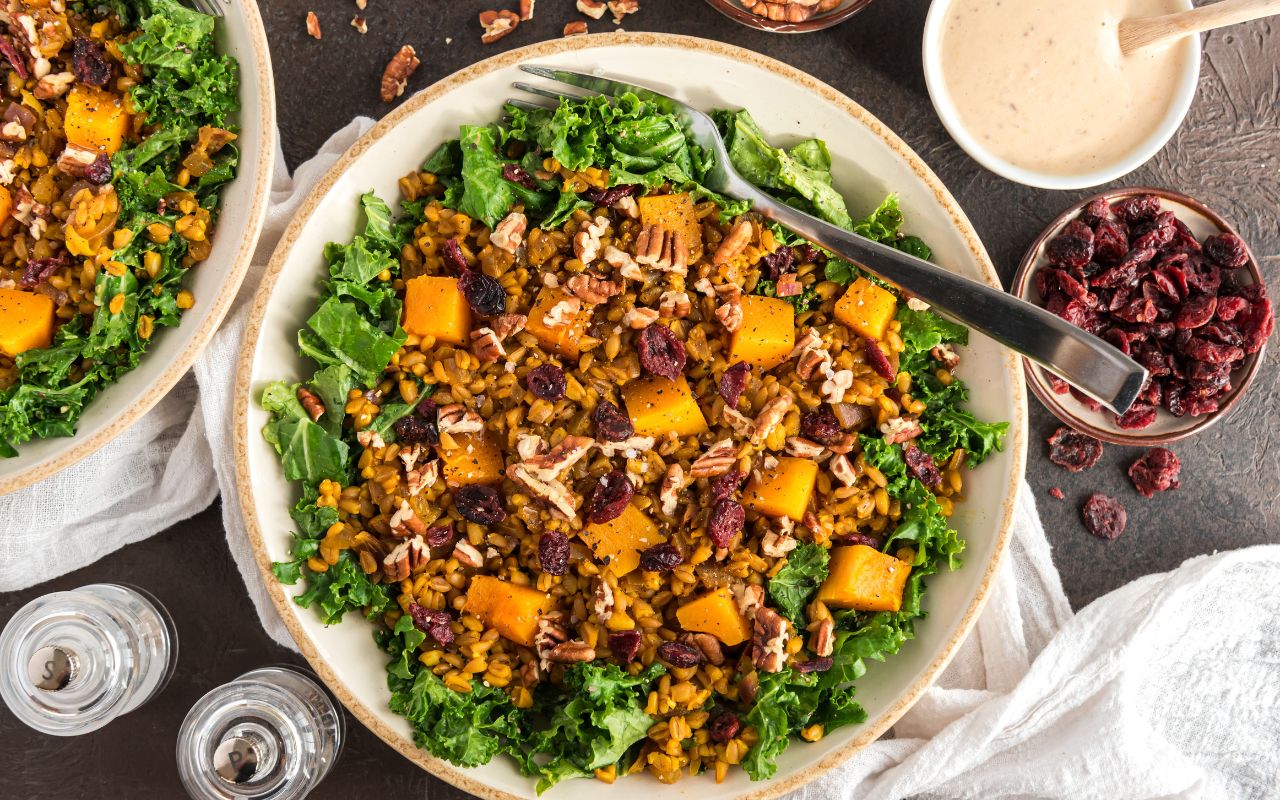
This Autumn Farro Salad With Butternut Squash and Kale is a vibrant, hearty main dish ideal for a turkey-free Thanksgiving spread. Roasted butternut squash and farro form a satisfying base, while a creamy tahini dressing with a touch of apple cider vinegar and maple syrup brings a bright, tangy flavor. Kale, sweet dried cranberries, and crunchy pecans add a festive touch, making this salad as beautiful as it is delicious — a perfect plant-based centerpiece for the holiday table.
2. Roasted Stuffed Butternut Squash
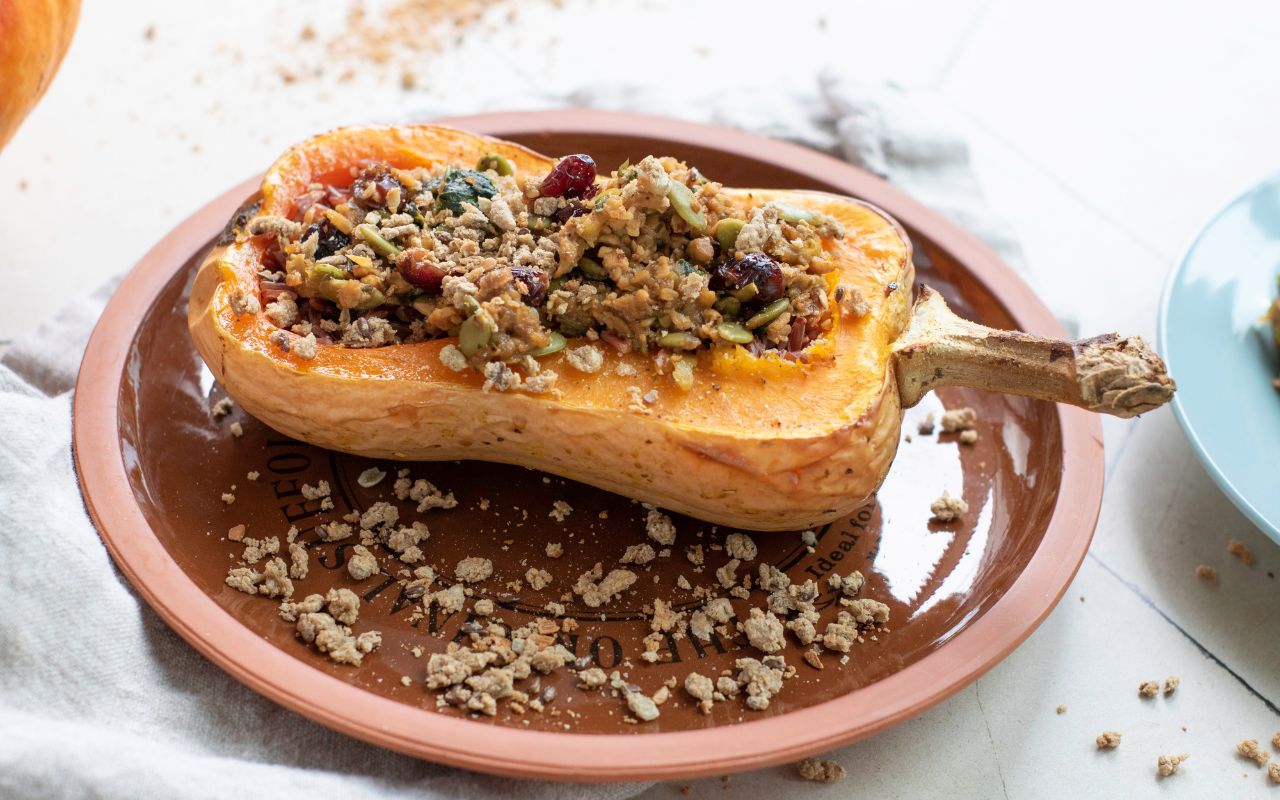
This Roasted Stuffed Butternut Squash is a stunning and satisfying vegan Thanksgiving entree. Tender butternut squash is roasted to golden perfection and then filled with a savory-sweet mix of wild rice, cranberries, pumpkin seeds, Apple Sage Tempeh Sausage, and vibrant kale, bringing hearty flavors and texture to every bite. Finished with fresh parsley and homemade breadless crumbs, this dish offers a rich, memorable alternative to traditional Thanksgiving mains.
3. Shepherd’s Pie
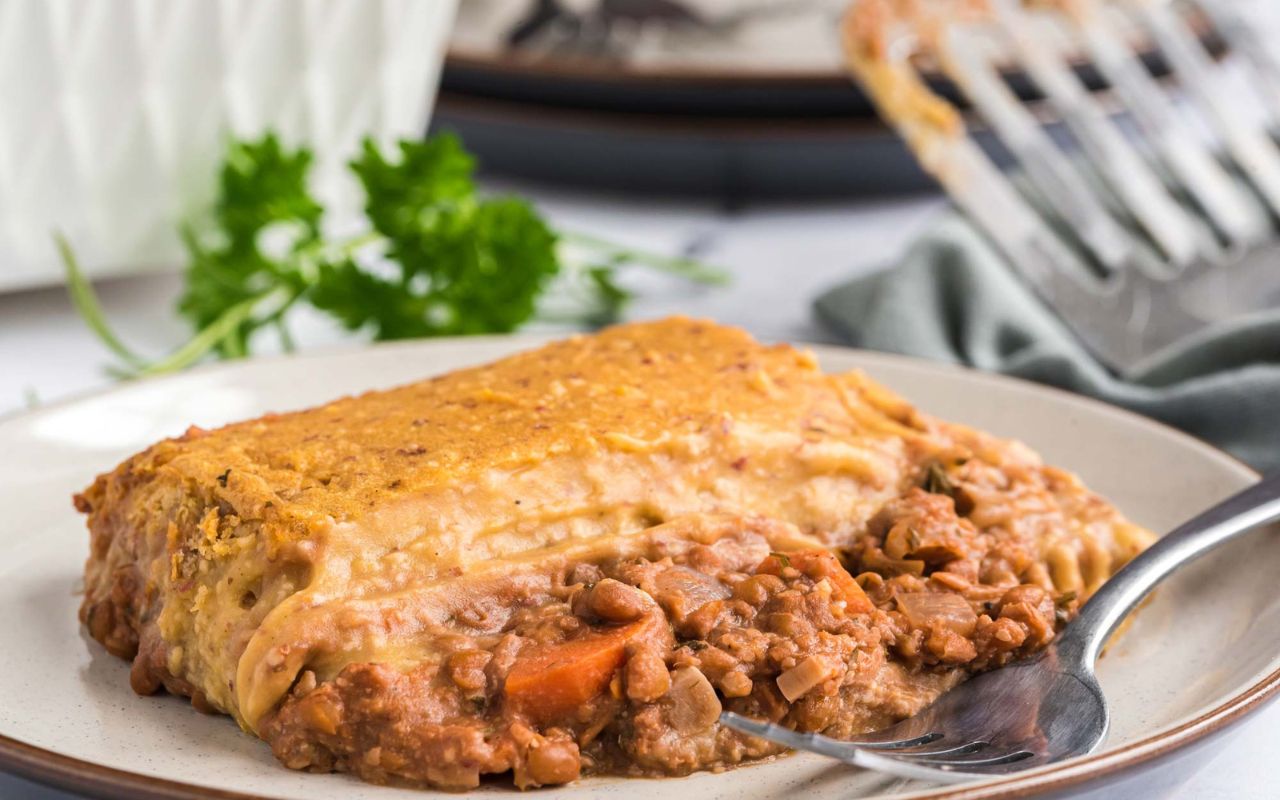
Turn up the holiday tunes and get cozy while making this heartwarming vegan Shepherd’s Pie, a Thanksgiving main that promises comfort and cheer for the entire family! The hearty lentil walnut base hits the spot, along with the robust and savory flavors from the tomato sauce and earthy herbs and spices. Crowned with a creamy mashed potato and butternut squash topping, this Shepherd’s Pie captures the festive spirit and is bound to make your guests feel nourished and loved!
4. “Cheesy” Spinach Lasagna
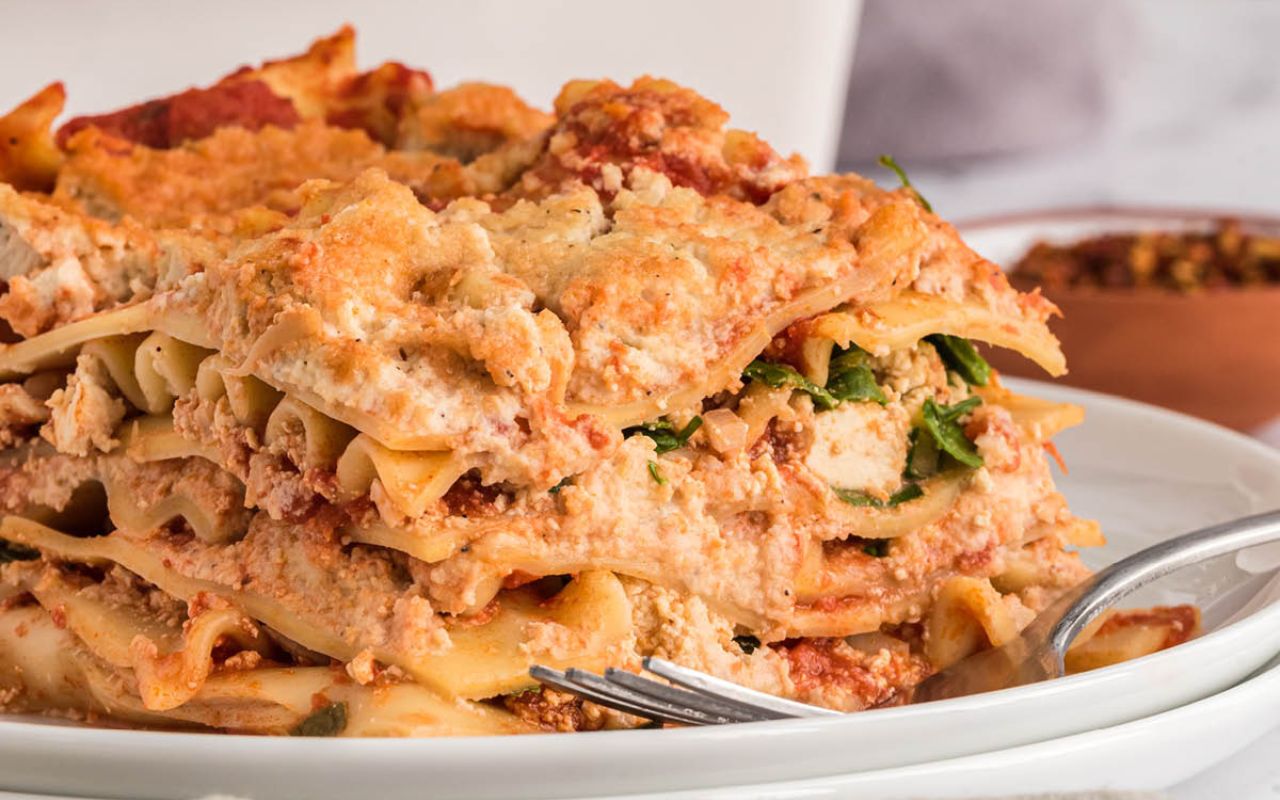
This “Cheesy” Spinach Lasagna is a hearty, crowd-pleasing vegan main, perfect for Thanksgiving. Layers of tender lasagna noodles, rich red pasta sauce, and creamy tofu ricotta and spinach make each bite comforting and flavorful. A luscious Cashew Cheese sauce adds a cheesy richness, while a sprinkle of Vegan Walnut Parmesan on top gives a satisfying crunch. With wholesome ingredients like tahini, nutritional yeast, and cashews, this lasagna brings warmth and indulgence to your holiday table — without the turkey!
5. Celebration Plant Roast

This Celebration Plant Roast is the perfect star for a vegan Thanksgiving feast—no turkey needed! Made with savory seitan, seasoned with thyme, sage, smoked paprika, and a hint of liquid smoke, this roast is as flavorful as it is satisfying. It’s slow-cooked in a rich marinade with hearty veggies and herbs, soaking up layers of comforting flavors. A final glaze of maple, tahini, and smoked paprika gives it a golden, caramelized finish that’s hard to resist. Slice into this plant-based roast for a main course that’s guaranteed to impress!
6. Blackened Tempeh and Sweet Potato Bowl With Avocado and Kale
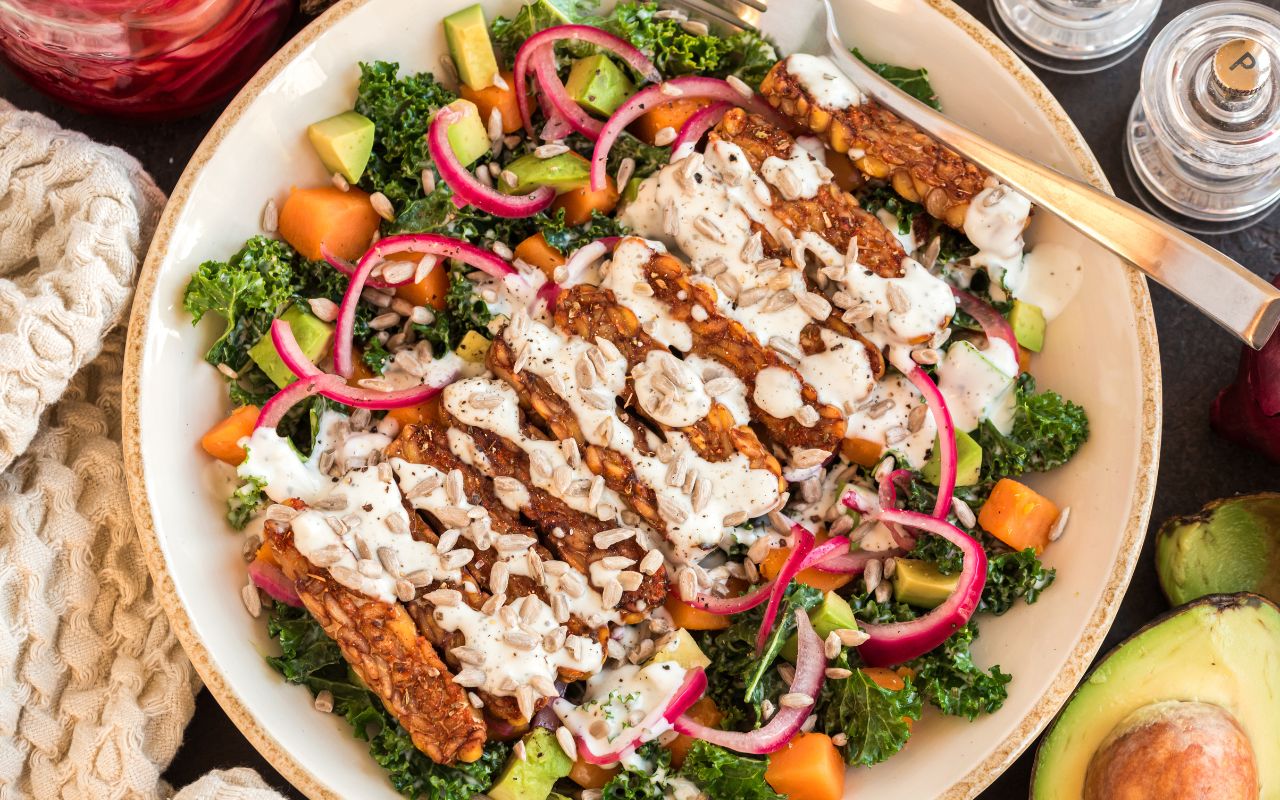
Spice up your Thanksgiving with this Blackened Tempeh and Sweet Potato Bowl — a deliciously bold alternative to traditional mains! Smoky tempeh and tender sweet potatoes are perfectly seasoned, bringing a Cajun-inspired kick that pairs beautifully with fresh kale, creamy avocado, and a touch of tofu ranch. Finished with tangy pickled onions and a sprinkle of crunchy sunflower seeds, this bowl is a satisfying blend of flavors and textures that’s as festive as it is filling. It’s a standout dish that brings excitement and plant-powered goodness to your loved ones.
7. Baked Chili and Potato Casserole
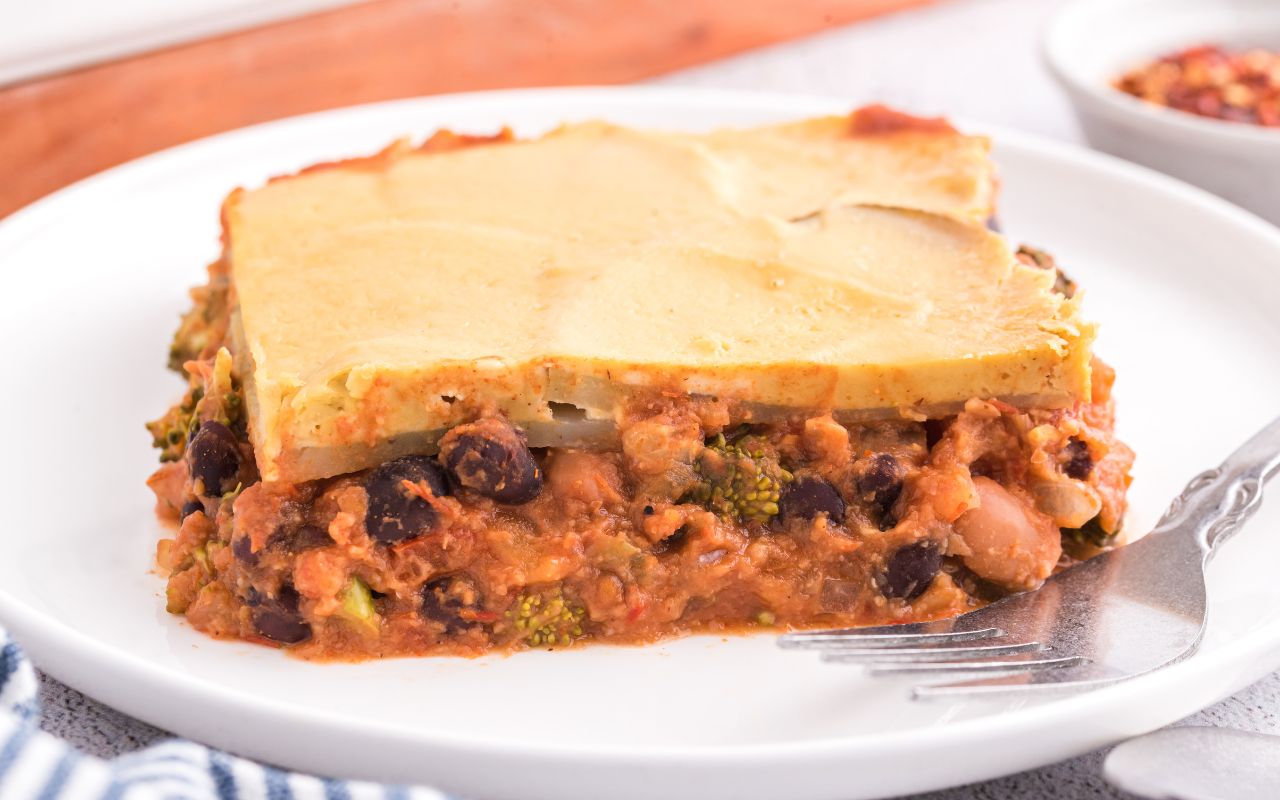
This Baked Chili and Potato Casserole is a cozy, crowd-pleasing option for your Thanksgiving feast! With layers of smoky black bean chili, seasoned potatoes, and tender broccoli, it combines hearty textures and vibrant flavors in every forkful. Topped with a creamy, melt-in-your-mouth “cheesy” sauce, this casserole is a satisfying, plant-based main that’s both indulgent and nourishing. It’s the perfect holiday dish to warm up the table and bring everyone together.
Enjoy a Turkey-Free Thanksgiving!
Thanksgiving can be a wonderful opportunity to showcase how delicious and satisfying plant-based dishes can be. By rethinking traditional holiday menus, we can create meals that taste great and align with the values of health, sustainability, and compassion.
These seven vegan entrees prove that a plant-based Thanksgiving can be as hearty, flavorful, and festive as one centered around turkey. Whether you’re fully plant-based or simply looking to incorporate more vegan options into your holiday spread, these dishes offer something for everyone.
Read Next:
- Holiday Meal Planning Tips and Recipes for Healthy & Happy Gatherings
- 5 Plant-Based Holiday Side Dishes So Good You’ll Actually Want Leftovers
- How to Cook: What to Do with Holiday Leftovers
Featured Image: iStock.com/GMVozd



